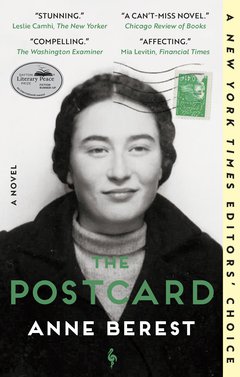Anne Berest
The Postcard
The book
A BEST BOOK OF 2023
A NATIONAL BESTSELLER
“A testament to the power of imagination and an investigation of empathy.”—Vogue
“Stunning.”—Leslie Camhi, The New Yorker
“A can’t-miss novel.”—Chicago Review of Books
Anne Berest’s The Postcard is among the most acclaimed and beloved French novels of recent years. It is at once a gripping investigation into family trauma, a poignant tale of mothers and daughters, and a vivid portrait of twentieth-century Parisian intellectual and artistic life.
January, 2003. Together with the usual holiday cards, an anonymous postcard is delivered to the Berest family home. On the front, a photo of the Opéra Garnier in Paris. On the back, the names of Anne Berest’s maternal great-grandparents, Ephraïm and Emma, and their children, Noémie and Jacques—all killed at Auschwitz.
Years after the postcard is delivered, the heroine of this novel is moved to discover who sent it and why. What emerges is a moving saga of a family devastated by the travails of the twentieth century and partly restored through the power of storytelling.
The author
Anne Berest
Anne Berest’s first novel to appear in English, The Postcard (Europa, 2023), was a national bestseller, a Library Journal, NPR, and TIME Best Book of the Year, a Vogue Most Anticipated Book of the Year, winner of the Choix Goncourt Prize, and runner-up for the 2024 Dayton Literary Peace Prize. It was described as “stunning” by Leslie Camhi in The New Yorker, as a “powerful literary work” by Julie Orringer in The New York Times Book Review, and as “intimate, profound, essential” in the pages of ELLE magazine. Her new novel, Gabriële (Europa Editions, 2025) is based on the life of Gabriële Buffet, whose extraordinary impact on 20th century avant-garde art and whose remarkable life have largely been obscured. Berest lives in Paris.
Press
- Apr 27 2024
“I think it's time we get to know this amazing author better.”
— Advanced Reading Copy - Jan 26 2024
“Precise analysis and candid self-disclosure.”
— The Sydney Morning Herald - Dec 6 2023
A Best Book of 2023
— Lilith Magazine - Dec 4 2023
“Best World Literature of 2023.”
— Library Journal - Nov 20 2023
A Best Book of the Year
— NPR - Nov 14 2023
“Must-Read Books of 2023.”
— TIME Magazine



